
Photo: maslee soon on flickr https://www.flickr.com/photos/mase_photo/
Islamic parties need politics that appeal to both Muslims and non-Muslims.
Last year, the leadership of Islamic party PAS decided to champion the implementation of hudud laws in Malaysia. By doing so, they smashed apart the common platform within the Pakatan Rakyat opposition coalition.
The coalition has since dissolved with both PKR and DAP forming Pakatan Harapan with PAN — a new party started by former PAS members.
PAS continued its hudud advocacy until mid-March, when in announcing its new coalition with the nascent Ikatan party, it decided to go soft in its push for implementing the strict Islamic penal code.
Clearly, PAS’ interest in implementing the law is flimsy at best, switching on and off despite the party consistently outlining its intention to establish the controversial Islamic laws in Malaysia.
The flip-flop shows that the implementation of hudud laws in Malaysia is not a religious issue, spurred on by religious impulses and motivation. Neither is it a political matter, as it is not about how best to govern the country.
Debate on the implementation of hudud in Malaysia is, in reality, a controversy over “political theology” — a framework to understand and engage society by playing off the dynamics of religion and politics. In fact, the whole issue emerged from competition among Islamic political parties to “out-Islam” one another for political-theological mileage.
This is neither, as often mischaracterised, an exploitation of religion for political benefits nor abuse of religion by the political, because Islam is understood to be pervasive in all dimensions of a Muslim’s life, including politics.
The underlying assumption of the competition to “out Islam” each other is that Muslims will vote for the party that appears to be most Islamic. The task is then to identify and capture Muslims’ political-theological aspirations. And since the most obvious sign of being Islamic is by establishing Islamic laws in society, Islamic parties frequently raise this possibility.
However, there are two barriers to Hudud implementation in Malaysia. First, the country’s non-Muslims which form about 40 per cent of the population do not favour such a proposal.
Second, PAS’ persistence for Hudud has also alienated progressive Muslims, who do not support such laws either. The political theology of Hudud as articulated and propagated by PAS is not convincing even to the Muslims.
PAS’ recent change of mind regarding Hudud is a sign that the party recognises the unpopularity of its proposal.
But key questions remain. First, have PAS leaders began to realise that their hudud ideology has failed to capture the political-theological aspiration of Muslims? And if so, can they bridge this gap?
Whatever the answers, Islamic parties should not stop advocating for hudud. Rather, there is an urgent need to re-examine and re-articulate a form of the Islamic law that is relevant to the present world and contemporary Malaysia.
The constructive political theology developed by Abdulaziz Sachedina, Professor and IIIT Chair in Islamic Studies at George Mason University, and outlined in his book Islam and the Challenge of Human Rights, serves as an appropriate model. He writes:
Islamic political theology based on the central doctrine of a just and merciful God bound by His own moral essence to guide humanity to create a just public order can serve as the major theological-ethical foundation for human rights and its prerequisite, namely, democratic governance in Muslim societies.
The popularity of current proposals will remain stagnant if not decrease as long as there is no deep thinking invested over the forms of hudud to be introduced. In other words, whichever party has the most compelling account of Islamic political theology will command the most Muslim support.
Better still would be an Islamic political theology that also appeals to non-Muslims.
Joshua Woo Sze Zeng is Special Officer to the Member of Parliament for Bukit Mertajam, Malaysia. He is an alumnus of Trinity Theological College and Cambridge University’s Inter-Faith Programme.
 Facebook
Facebook  Twitter
Twitter  Soundcloud
Soundcloud  Youtube
Youtube  Rss
Rss 